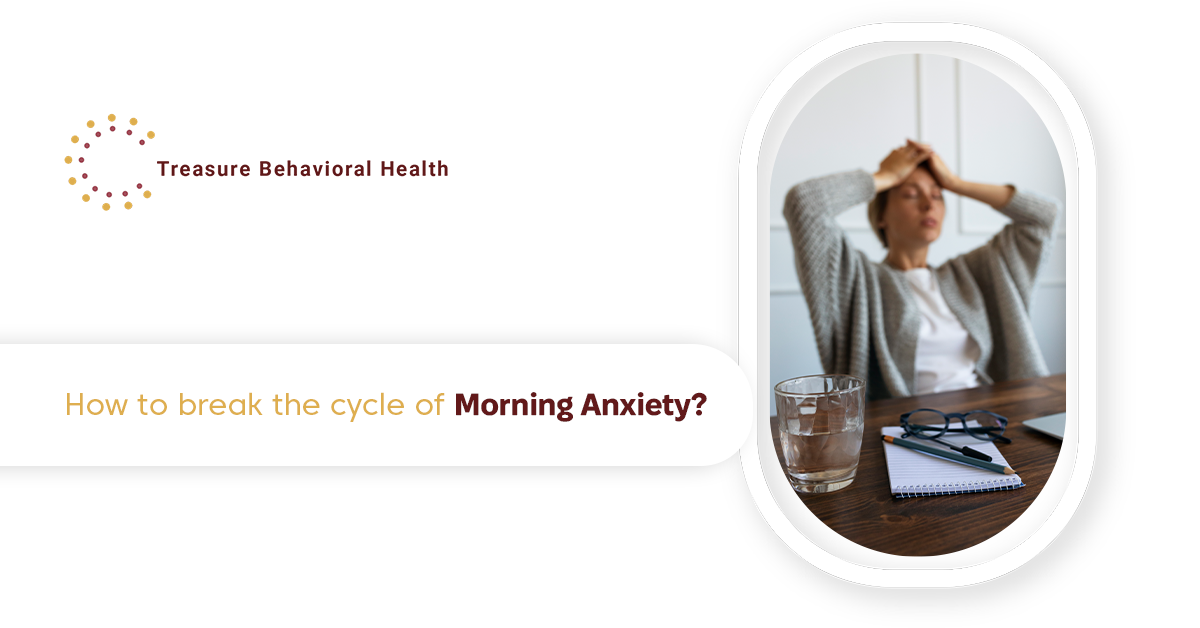Waking up with a racing heart, a knot in your stomach, or a sense of dread before your day starts isn’t just in your head—it’s a real and painful experience for many.
Your internal sense of heaviness seems to pile up just before you wake up, and it weighs heavily on you throughout the early morning hours.
This blog presents a research-based and compassionate approach to show you how to break the cycle of morning anxiety.
What Is Morning Anxiety?
The unpleasant feelings people experience upon waking represent morning anxiety.
This condition does not receive official medical diagnosis status. The symptoms can look like:
- You might experience both stomach distress and chest pressure
- A tight chest or upset stomach
- Racing thoughts
- Difficulty concentrating
- Fatigue despite sleep
This happens because of biological and emotional triggers, one of the biggest culprits being morning anxiety cortisol levels.
The Role Cortisol Can Play in Your Morning Anxiety
Our bodies naturally produce the stress hormone cortisol through the operation of the circadian rhythm.
Human bodies release their highest cortisol levels during a cortisol awakening response (CAR) process that occurs minutes after waking up.
Increased cortisol and anxiety in the morning go hand-in-hand.
People with generalized anxiety disorder normally present increased cortisol levels at the beginning of their day compared to other individuals.
So when you ask, “Why do I wake up with anxiety in my stomach?” — part of the answer lies in symptoms of high cortisol levels in morning, like:
- Nausea or digestive issues
- Shakiness
- Heart palpitations
- Sweating
- Feeling overwhelmed or paralyzed
How to Break the Cycle of Morning Anxiety?
A solution exists for people who find themselves trapped in continuous anxious mornings.
The pivotal element for breaking free from morning anxiety lies in comprehending your physical and mental body functions.
The following section explains an effective method on how to combat anxiety in the morning:
Don’t Rush Out of Bed
Ease into your morning by:
- Taking 5–10 slow, deep belly breaths
- Keeping your hand on your belly while you focus on grounding yourself
- Saying an affirmation: “I’m safe right now.”
The action interrupts the cortisol surge as it communicates to your nervous system that you are safe.
Move Gently
Since stretching and yoga reduce morning anxiety and cortisol levels, individuals should practice these gentle body movements.
The physical activity produces endorphins and stabilizes the levels of adrenaline.
Try:
- A short walk outside
- Light yoga or mobility work
- Foam rolling or mindful stretching
Nutrition and Hydration
In early mornings, blood sugar levels remain low in your body. Having a healthy breakfast stabilizes your emotional state and energy levels.
To combat anxiety in the morning:
- It is best to avoid consuming caffeine without having food first
- You should consume meals containing protein, including eggs, oats, and nuts
- Stay hydrated—dehydration mimics anxiety symptoms
Mindfulness or Meditation
Your day can shift positively through only 5 minutes of meditation, even if anxiety’s bad in the morning.
The practice calms the amygdala (the brain’s fear center), which reduces cortisol and anxiety in the morning.
Try using Headspace, Calm, and Insight Timer.
These are some apps that can provide specific meditation sessions designed for anxiety.
Set a Simple Morning Routine
Your brain responds to unpredictable mornings by activating its threat system. A soothing daily routine should include the following steps:
- Making your bed
- Journaling 3 things you’re grateful for
- Setting an intention for the day
The structure signals safety to your mind.
Get to the Root Cause
If you’ve tried everything and still wonder, “How can I stop morning anxiety?”, it may be time to look deeper.
An analysis of your condition may be necessary if your many efforts to eliminate morning anxiety continue to be unsuccessful.
Morning anxiety develops when people face long-term stress, emotional neglect, and traumatic experiences.
Your body needs help because it demonstrates weakness while you persistently fail to understand this signal.
When to Get Professional Help for Morning Anxiety
If you’re:
- Waking up anxious most days
- Struggling to function normally
- Noticing your symptoms are actually worsening
Then don’t wait. Optimal management of morning anxiety happens with professional help because it generally yields sustainable results.
You Deserve a Peaceful Morning
Your life can exist beyond survival mode daily. Suffering from anxiety at awakening or requiring support does not imply weakness.
You’re human.
Breaking morning anxiety patterns requires dedication since it extends beyond a simple solution.
Self-compassion, patience, and appropriate tools will establish peace.
Next Steps
Treasure Behavioral Health stands ready to support anyone looking to escape this routine.
Mental health professionals at our practice provide anxiety treatment through proven, effective therapeutic methods.
Contact us today. Get to experience the peaceful mornings you rightfully deserve.
FAQs
What are the symptoms of high cortisol levels in the morning?
Symptoms include:
- Nausea
- Rapid heartbeat
- Stomach discomfort
- Irritability
- Fatigue—even after sleep
What’s the connection between morning anxiety and cortisol?
Individuals with anxiety experience morning cortisol spikes, which often resemble panic. Cortisol management leads to decreased symptoms of morning anxiety.

No comment